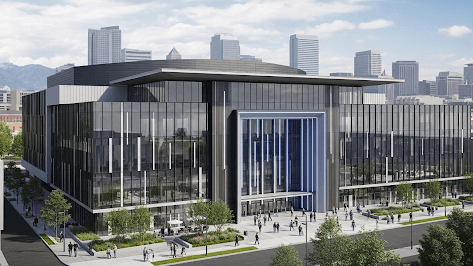
New Leadership in the Salt Lake City Police Department
Salt Lake City has recently witnessed a significant leadership shift within its police department, heralded by the appointment of new Police Chief Brian Redd. Since taking office in March, Chief Redd has moved swiftly to rejuvenate the department’s upper ranks, making clear changes to enhance operational efficacy and community relations.
Introducing the New Deputy Chiefs
In a bold move, Chief Redd has appointed three new deputy chiefs to his executive leadership team: Alex Garcia, Brandon Christiansen, and Bill Manzanares. With Manzanares stepping into his role immediately, the other two deputy chiefs are set to commence their duties by early August.
These appointments come as a direct result of Redd’s intention to foster a proactive and responsive police force, particularly in a community facing increasing scrutiny amid discussions about homelessness and drug-related issues. His proactive approach signals a shift toward a more community-driven policing philosophy, something he emphasized when he stated, "You don’t come to Salt Lake City to deal drugs and use drugs." This statement indicates an uncompromising stance against drug activity while also prioritizing community engagement.
Communication is Key
Alongside the deputy chiefs, Glen Mills will replace previous communications director Brent Weisberg. Open and effective communication between the police department and the community is crucial for building trust and transparency. Mills is expected to play a vital role in enhancing public knowledge about police activities and fostering community cooperation.
A Closer Look at the Departing Officers
As new leaders take the helm, the department bids farewell to Deputy Chief Victor Siebeneck and Deputy Chief Andrew Wright, along with former communications director Brent Weisberg. Redd expressed gratitude for their service. This transition not only brings fresh perspectives but also reflects an effort to reassess leadership dynamics within the department, potentially reshaping how policy and community challenges are addressed.
Community Backdrop and Current Challenges
The Salt Lake City police force is currently operating in a challenging environment marked by rising concerns over homelessness and substance abuse. Redd’s intent to prioritize these issues sets a clear path for the new leadership team. Addressing these challenges effectively will require innovative strategies and community collaboration. With recent shifts in policing policies and public sentiments, these leadership changes resonate deeply within the city’s ongoing movements.
Looking Ahead: Expectations and Opportunities
The appointment of Redd's leadership team offers both challenges and opportunities for Salt Lake City’s policing strategy. Community members are likely hoping for more visible policing that not only tackles crime but also engages collaboratively with residents. Furthermore, as new policies are implemented, they will need to reflect community needs, especially in areas heavily affected by social issues.
Chief Redd’s leadership philosophy hints at a greater emphasis on addressing the root causes of crime. Under his direction, we can expect a policing model that encourages not just enforcement, but also preventative measures aimed at enhancing community wellbeing. This shift in focus could signal a transformation in how the community interacts with law enforcement.
The Role of Community Engagement
Central to Redd's approach is the understanding that community involvement is crucial for effective policing. Engaging local stakeholders, from community leaders to everyday citizens, facilitates transparency and helps build trust, which is essential for effective law enforcement. This strategy also encourages collaboration on initiatives that address broader social challenges.
Conclusion: A New Era for Salt Lake City Policing
The shakeup within Salt Lake City’s police department heralds a new era of leadership, promising innovative solutions to pressing community issues. As the new deputy chiefs and communications director step into their roles, the focus on enhanced community relations promises significant potential for positively impacting the city. Shifting towards a community-oriented policing model could prove vital in transforming public perceptions and fostering a safer, more inclusive environment.
Stay informed with the latest developments in Salt Lake City news by following our updates and community reports. Engaging with your community gives you a voice in the dialogue crucial for shaping the future of public safety and community harmony.
 Add Row
Add Row  Add
Add 




Write A Comment